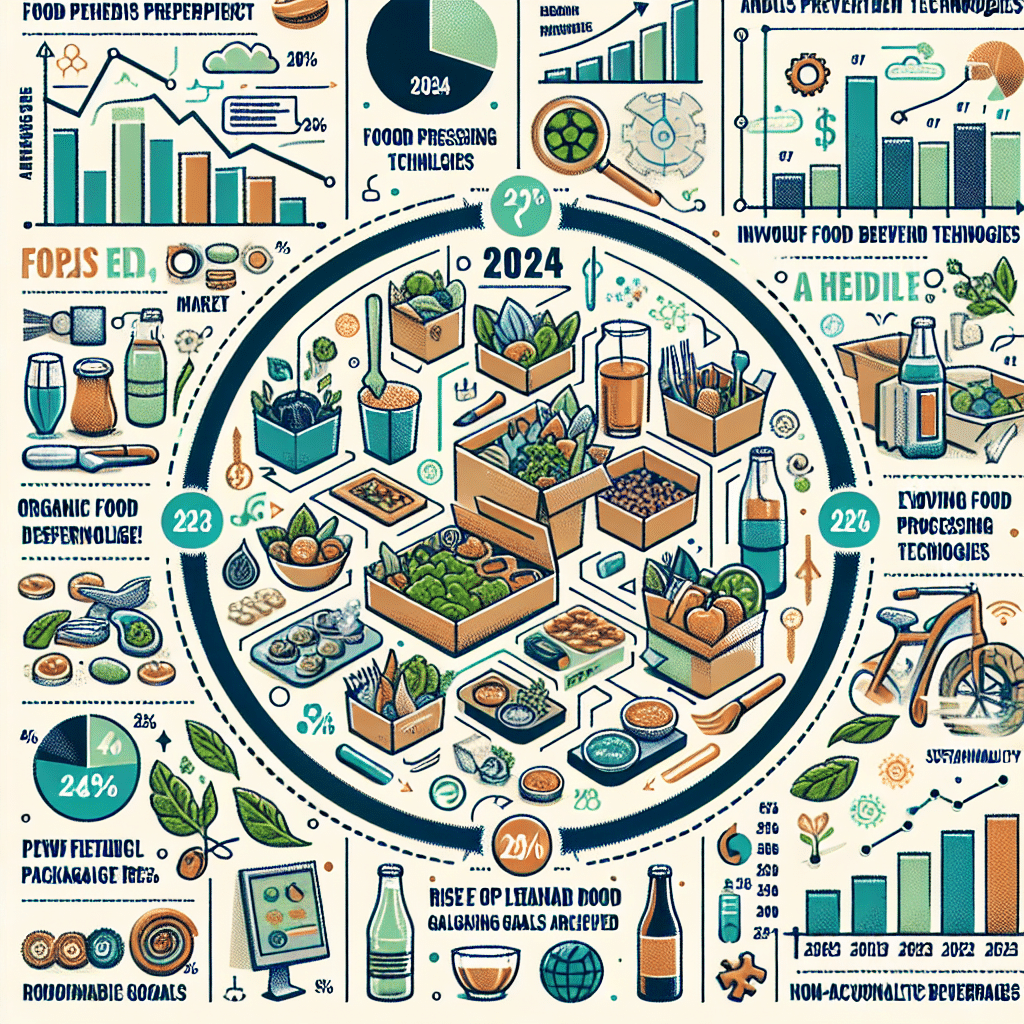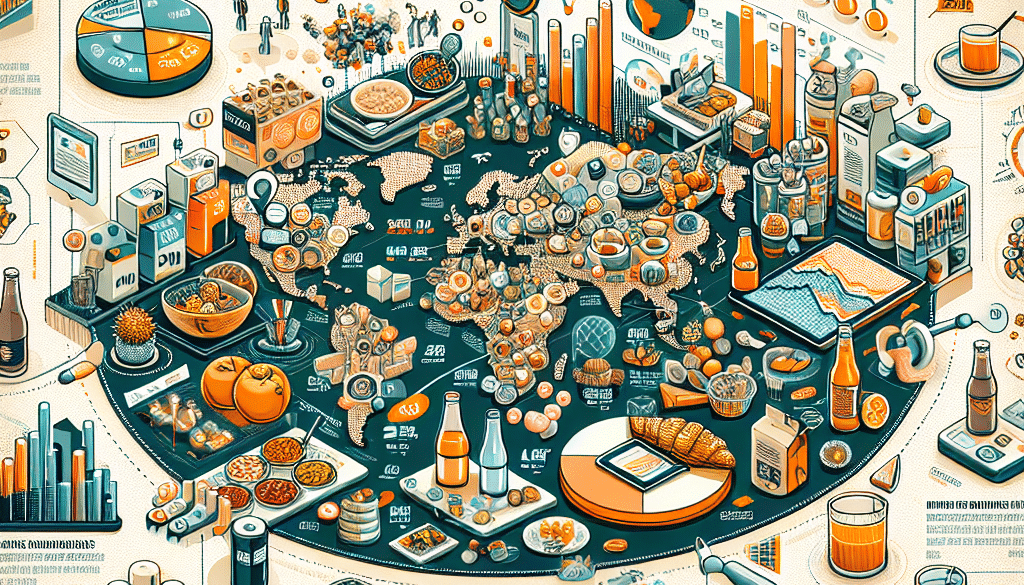Insights Review 2024: Food and Beverage Industry Highlights
-
Table of Contents
- 2024 Food and Beverage Industry Insights: Key Highlights and Trends
- Consumer-Driven Trends Shaping the Market
- Technological Innovations Driving Industry Growth
- Regulatory Changes and Their Impact
- Case Studies: Success Stories and Lessons Learned
- Challenges and Opportunities Ahead
- Conclusion: Key Takeaways from 2024
- ETprotein: Elevating the Industry with High-Quality Protein Products
2024 Food and Beverage Industry Insights: Key Highlights and Trends

The food and beverage industry is a dynamic and ever-evolving sector, shaped by consumer preferences, technological advancements, and global economic factors. As we review the industry highlights for 2024, it’s clear that businesses within this space have navigated a complex landscape to meet the changing demands of consumers. This article delves into the key trends, challenges, and innovations that have defined the food and beverage industry in 2024.
Consumer-Driven Trends Shaping the Market
Understanding consumer behavior is crucial for success in the food and beverage industry. In 2024, several consumer-driven trends have emerged, significantly influencing product development and marketing strategies.
- Health and Wellness: Consumers continue to prioritize health and wellness, seeking out products with functional benefits, clean labels, and transparent sourcing.
- Sustainability: The demand for sustainable and eco-friendly products has soared, with a focus on reducing carbon footprints, ethical sourcing, and minimizing waste.
- Convenience: Busy lifestyles have led to a rise in demand for convenient food options, including ready-to-eat meals, meal kits, and on-the-go snacks.
- Personalization: Advances in technology have enabled brands to offer personalized nutrition, catering to individual dietary needs and preferences.
Technological Innovations Driving Industry Growth
Technology has played a pivotal role in transforming the food and beverage industry in 2024. From production to distribution, technological innovations have streamlined operations and enhanced the consumer experience.
- Automation and Robotics: Automation has increased efficiency in manufacturing, with robots handling repetitive tasks, leading to cost savings and improved safety.
- Artificial Intelligence (AI): AI has revolutionized data analysis, enabling companies to predict trends, optimize supply chains, and personalize customer interactions.
- Blockchain: Blockchain technology has improved traceability and transparency, allowing consumers to track the journey of their food from farm to table.
- Alternative Proteins: Investment in plant-based and lab-grown proteins has surged, driven by consumer demand for sustainable and ethical protein sources.
Regulatory Changes and Their Impact
Regulatory bodies worldwide have introduced new policies and regulations in response to health concerns, environmental issues, and technological advancements. These changes have had a significant impact on the food and beverage industry in 2024.
- Labeling Requirements: Stricter labeling regulations have been implemented to ensure greater transparency regarding ingredients, allergens, and nutritional information.
- Food Safety Standards: Enhanced food safety protocols have been established to prevent contamination and ensure the integrity of the global food supply chain.
- Sustainability Mandates: Governments have introduced mandates to reduce environmental impact, such as restrictions on single-use plastics and incentives for sustainable packaging solutions.
Case Studies: Success Stories and Lessons Learned
Several companies within the food and beverage industry have stood out in 2024 for their innovative approaches and successful adaptation to market changes. Here are a few notable examples:
- Company A’s Sustainable Packaging Initiative: By switching to biodegradable materials and optimizing packaging design, Company A reduced its carbon footprint and appealed to eco-conscious consumers.
- Company B’s AI-Powered Personalization: Leveraging AI, Company B offered customized nutrition plans based on individual health data, gaining a competitive edge in the market.
- Company C’s Plant-Based Product Line: Responding to the alternative protein trend, Company C expanded its offerings with a range of plant-based products, capturing a significant share of the market.
Challenges and Opportunities Ahead
While the food and beverage industry has seen remarkable growth and innovation in 2024, it also faces several challenges and opportunities as it looks to the future.
- Supply Chain Resilience: Companies must continue to build resilient supply chains to withstand disruptions caused by climate change, geopolitical tensions, and pandemics.
- Adapting to Consumer Preferences: Staying ahead of rapidly changing consumer preferences requires agility and a willingness to innovate in product development.
- Embracing Sustainability: There is a growing opportunity for businesses to lead the way in sustainability, from sourcing to production to packaging.
Conclusion: Key Takeaways from 2024
The food and beverage industry in 2024 has been marked by a strong emphasis on health, sustainability, and technology. Companies that have embraced these trends and adapted to regulatory changes have found success. Looking ahead, the industry must continue to innovate and respond to the evolving needs of consumers while navigating the challenges of a complex global market.
ETprotein: Elevating the Industry with High-Quality Protein Products
In light of the growing demand for sustainable and health-conscious food options, ETprotein’s range of organic bulk vegan proteins and L-(+)-Ergothioneine (EGT) products stand out in the market. Their commitment to non-GMO, allergen-free, and high-purity ingredients makes them an ideal partner for food and beverage companies looking to enhance their product offerings with clean, plant-based proteins.
Whether you’re developing sports nutrition products, dietary supplements, or health and wellness foods, ETprotein’s expertise and extensive product range can help you meet the demands of today’s conscious consumers. By choosing ETprotein, you’re not only getting quality ingredients but also supporting a sustainable and ethical approach to food production.
About ETprotein:
ETprotein, a reputable protein and L-(+)-Ergothioneine (EGT) Chinese factory manufacturer and supplier, is renowned for producing, stocking, exporting, and delivering the highest quality organic bulk vegan proteins and L-(+)-Ergothioneine. They include Organic rice protein, clear rice protein, pea protein, clear pea protein, watermelon seed protein, pumpkin seed protein, sunflower seed protein, mung bean protein, peanut protein, and L-(+)-Ergothioneine EGT Pharmaceutical grade, L-(+)-Ergothioneine EGT food grade, L-(+)-Ergothioneine EGT cosmetic grade, L-(+)-Ergothioneine EGT reference grade and L-(+)-Ergothioneine EGT standard. Their offerings, characterized by a neutral taste, non-GMO, allergen-free attributes, with L-(+)-Ergothioneine purity over 98%, 99%, cater to a diverse range of industries. They serve nutraceutical, pharmaceutical, cosmeceutical, veterinary, as well as food and beverage finished product distributors, traders, and manufacturers across Europe, USA, Canada, Australia, Thailand, Japan, Korea, Brazil, and Chile, among others.
ETprotein specialization includes exporting and delivering tailor-made protein powder and finished nutritional supplements. Their extensive product range covers sectors like Food and Beverage, Sports Nutrition, Weight Management, Dietary Supplements, Health and Wellness Products, and Infant Formula, ensuring comprehensive solutions to meet all your protein needs.
As a trusted company by leading global food and beverage brands and Fortune 500 companies, ETprotein reinforces China’s reputation in the global arena. For more information or to sample their products, please contact them and email sales(at)ETprotein.com today.












